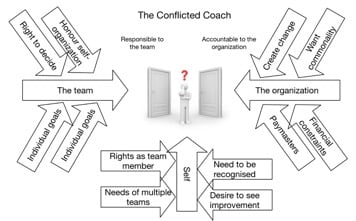Coaching conflicts
Last year I was coaching a team. One of the big problems the team faced was excessive work in progress – and tendency for developers to start new work when they hit a blockage. Eventually, with the help of the Product Owner who saw the problem too, we starved the work pipeline. The team actually ran out of work. We saw this as a great success. It had never happened before and meant we could really focus and prioritise work.
Unfortunately, this happened when the two of us were not instantly available. You can argue that we should have been instantly available. Or that people should have made more of an effort to contact us. Or that we should have left a secret stash of work to do. Or that the team should have self-organized to fix the problem. That is easy in retrospect but really, I still don’t see it as a problem.

A few hours without work? I see it as a momentous moment, the start of something great.
But that is not how others saw it. The team, the Product Manager, another Agile Coach on site, and anyone these people could tell were quick to tell us how awful it was: “the team ran out of work.” Word spread quickly that the team had run out of work. My name was dirt.
Doing good by one group isn’t always seen as good by others. When you work as an agile coach conflicts occur daily. But some are bigger and more persistent than others.
For most of the last 10 years I’ve mainly worked as a “drop in” coach (“light touch” I like to call it). I visit clients for a short period of time, talk about improvements, problems, solutions, give directive or non-directive coaching and don’t return for days or weeks. I’m not the same clients every week, maybe I drop in a few days a month and talk to people.
Last year was different, I spent almost all of it with one company, mostly embedded in one team as an official “Agile Coach.”
Comparing these two approaches to coaching has left me with a lot to reflect on. In particular I found a number of conflicts which troubled me, I’m not sure I ever worked these out and I’m sure others find the same things. So I’d like to share…
Responsible to the team, accountable to the organization
I was lucky, it was one of the team members who called me in but it was the bigger organization that was paying my fees. While I felt responsible to the team I was accountable to the organization.
That organization wanted things and expected me to deliver: they wanted a team which performed better (delivered more stuff and more value!) They wanted the team to share common practices and ceremonies with other teams.
For the organization I was the bringer of change to the team. But I could only do that if I was accepted by the team. That limited my ability to push through changes. Even if nobody else saw that conflict I felt it every day.
At one level team did want to change but they also wanted the organization to change and I had very little power there. Both sides, the team and the organization had no-go areas. More conflict.
The organization restricted my ability to do things I thought would improve the team. Things the team accepted would help: like spending money on training. So I was bearer of bad news to both sides: one side saw me asking, then arguing for money while the other saw me failing to deliver.
That organization also expected me to operate within the organization: join coaches meetings, sign up to shared coaching goals, complete team assessments, etc. None of these things were necessarily bad in their own right but it meant I had two masters: the team and the organization.
When push came to shove I prioritised the team but I know some coaches who prioritised the organization. I know some team members mistrusted their coaches because they believed their coach would put the organization first.
Honouring self-organization but creating change
So an agile team is self-organizing. That gives them the right to self-organise to work exactly as they do today. Self-organization gives them the right to not change anything – something I wrote about way back in Changing Software Development.
But, almost by definition, the (agile) coaches role is to bring about change, to help the team do better. Conflict is inevitable.
Sure you say “its a question of motivation … the coach needs to create the motivation to change and do better” and I would agree, but, even in creating that motivation one is creating change, one is intervening. Which brings us nicely to….
Leading without authority
Agile coaches lack authority – if they had authority they would be managers, I’ll blog about that in future. In a way not having authority is liberating, one can’t use the whip no matter how much one wants to! But it is also difficult.
The organization, and the coach, wants to create change but without authority even the smallest changes can become massive efforts. When the team is divided themselves, or even when one team member objects to implementing a change becomes like wading through treacle. That can be demoralising for the coach.
Yet a little authority can go a long way in pushing through change and overriding objections.
And on occasions I did reach for authority, but that creates a conflict within oneself as a coach: was I right to do it? am I honouring the team? the team members? am I creating a learned dependency?
Accepted while pushing the unpopular
Nowhere is that conflict clearer then when pushing through an unpopular change in the face of opposition – even minority opposition. As a coach one risks loosing future changes because, most change the coach “initiates” is done with the acceptance of the team, pushing through an unpopular change – even with a majority, even with leadership support – risks future acceptance.
One is constantly asking: how far can I take this team right now?
And: if I take them too far will they trust me tomorrow?
And, most of all: am I right to do this?
Hardly a day pasted last year when I didn’t agonise over these questions. And as I write this I imagine one of those teams members reading this and saying “Huh, and you got it wrong.”
Who gets the credit?
As a coach your job is to make others perform better, but really, only they can perform better. You can’t make them, you can only help them. The final decisions rest with them.
So who should get the credit? – surely it is them, they made the change, they did something different.
That creates an inner conflict. It also creates a conflict with the organization: why should they keep me employed? After all I didn’t make any difference, they did it.
We know the value of positive praise and acknowledgement, but when there is nobody to praise you, when the team don’t recognise the coaches role (which can be hard if the coach is doing a good job) then one becomes demoralised and that saps ones strength to carry on.
As people we need acknowledgement, as a human we all have needs. But the coaches role so often demands that we forego acknowledgement, praise and recognition.
Conflicts exists
This isn’t an exhaustive list of the conflicts I’ve encountered and hopefully as you read this you can see solutions – I can myself! But what I want to say is: these conflicts exist, I’m sure other coaches have them and even when there are solutions those solutions need to be applied.
Living with these conflicts can be hard, mentally and emotionally. Burnout happens to coaches.
And organizations get fed up with coaches who don’t deliver change, don’t turn up to non-team meetings, keep asking for money, don’t crack the whip or exceeds their (none existent) authority.
Published on Java Code Geeks with permission by Allan Kelly, partner at our JCG program. See the original article here: Coaching conflicts Opinions expressed by Java Code Geeks contributors are their own. |


